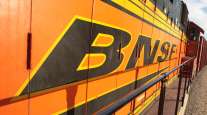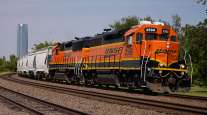BNSF Slows Oil Trains Ahead of Peers

BNSF Railway Co., the largest hauler of crude by rail, moved ahead of U.S. peers in the push for safety by reducing oil-carrying train speeds beyond an agreement last year between regulators and the railroads.
BNSF’s oil trains will go 35 miles per hour in areas with at least 100,000 residents, a 30% reduction in speed in some cases, the company said March 30.
Union Pacific Corp., the largest U.S. railroad by revenue, said it will study BNSF’s actions, while CSX Corp. and Norfolk Southern Corp., the two largest railroads in the eastern U.S., said they aren’t taking similar steps.
“Norfolk Southern remains committed to improving the safety of crude oil transportation by rail,” Rick Harris, a company spokesman, said. “We are not planning additional changes at this time.”
BNSF, owned by Warren Buffett’s Berkshire Hathaway Inc., in its effort to improve safety last year announced a plan to buy 5,000 tank cars that exceeded industry standards. Railroads historically don’t own crude tank cars, which usually are provided by the refineries or leasing companies. That order is awaiting new tank car regulations that may be announced in May, said Mike Trevino, a BNSF spokesman, on March 30.
The safety of moving crude by rail became a priority for U.S. and Canadian authorities after a runaway oil train exploded in the Quebec town of Lac Megantic in July 2013, killing 47 people.
BNSF’s decision to take extra safety measures comes after four crude trains derailed, including a BNSF train in Illinois, and caught fire in separate accidents since the start of February.
U.S. railroads agreed with the Department of Transportation last year to lower crude train speeds to 40 mph in 46 high threat areas from 50 mph. BNSF’s reduction includes more areas. BNSF also said it’s stepping up inspections and monitoring of rail cars.
“Union Pacific is committed to continuously improving rail safety and has implemented several operational changes for handling crude oil trains, including speed restrictions,” Aaron Hunt, a spokesman for the Omaha, Nebraska-based railroad. “We will study BNSF’s restrictions to determine if they make sense.”
Canadian National Railway Co. lowered the speed of “key trains” to 35 mph in major census metropolitan areas in Canada, said Mark Hallman, a spokesman, in an e-mail. Martin Cej, a spokesman for Canadian Pacific Railway Ltd., declined to comment on BNSF’s decision.




